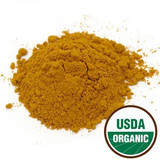

NuHerbs Lab Tested
Andrographis Herb (Chuan Xin Lian) - Cut Form 1 lb. - Nuherbs
Herbal Information for Andrographis Herb in Cut Form
Codonopsis Root: What Does It Do?
Codonopsis root, derived from the Codonopsis pilosula plant and belonging to the Campanulaceae family, is a versatile herbaceous perennial widely cultivated throughout Asia. Known as Dang Shen in Traditional Chinese Medicine (TCM), codonopsis root is not only a common ingredient in soups and stews but also a revered medicinal herb with a rich history of use. This root is often referred to as the "poor man's ginseng" due to its similar benefits at a more affordable price.

Medicinal Properties and Traditional Uses
In TCM, codonopsis root is highly valued for its ability to tonify the middle jiao (the digestive system), invigorate lung and spleen qi, nourish the blood, and generate body fluids. These actions make it particularly useful for individuals experiencing fatigue, weakness, or chronic illness. It is often used as a mild yet effective tonic to strengthen the body, boost energy levels, and support overall vitality.
Codonopsis is also known for its adaptogenic properties, which help the body resist and recover from stress and illness. Adaptogens like those found in codonopsis help to regulate the body's response to stress, promoting balance and resilience. Additionally, the root contains demulcent compounds that soothe and moisten mucous membranes, making it beneficial for respiratory and digestive health.
Health Benefits and Modern Research
Recent studies have highlighted the broad spectrum of health benefits associated with codonopsis root, confirming its traditional uses and uncovering new potential. Key benefits include:
Usage and Applications
Codonopsis root can be incorporated into daily routines in various forms. It is commonly used in soups and stews to impart its health benefits through food. It can also be consumed as a tea, tincture, or in powdered form, making it easy to add to smoothies, beverages, or capsules.
Overall, codonopsis root is a versatile and highly beneficial herb that offers a wide range of health benefits, from boosting immunity and energy levels to supporting cardiovascular, digestive, and respiratory health. Whether used as a daily tonic or a targeted remedy, codonopsis root is a valuable addition to any natural health regimen.

Common Name: Codonopsis Root, Codonopsis, False Ginseng, Bonnet Bellflower, Bastard Ginseng, Tangshen, Chuan Dang, Radix Codonopsitis Pilosulae, Poor man's ginseng, Bonnet Flower Root
Botanical Name: Codonopsis pilosula
Chinese / Pin Yin Name: Dang Shen
Codonopsis Root Dosage: Consult your healthcare provider for your correct dose.
Codonopsis Root Precautions: Do not use if pregnant or nursing. Side effects have been reported such as: dizziness, discomfort in the chest area, feeling nervous and uneasy, and dry mouth.
Codonopsis root can be used in cooking, teas, decoctions, tinctures and in a compress. Codonopsis powder is perfect to make your own fresh filler-free capsules or added to your recipes.
Codonopsis Root Herb Category:
Codonopsis Root Properties: Sweet, Neutral
Codonopsis Root Channels / Meridians: Lung, Spleen
Codonopsis Root Naturally Occurring Components: α-Spinasterol, Stigmasta-7, 22-dien-3-one, Codopiloic acid, Octadecadienoic acid, polysaccharides, inulin, saponins, scutellarein, resins, mucus, glycosides
Astragalus Patchouli Notoginseng Schisandra Bai Zhu
References
https://tcmwiki.com/wiki/dang-shen
https://herbpathy.com/Uses-and-Benefits-of-Dang-Shen-Cid2477
https://www.ncbi.nlm.nih.gov/pmc/articles/PMC4287686/
https://www.sciencedirect.com/topics/medicine-and-dentistry/codonopsis
https://www.americandragon.com/Individualherbsupdate/DangShen.html
https://www.healthbenefitstimes.com/codonopsis/


NuHerbs Lab Tested
Herbal Information for Andrographis Herb in Cut Form


Nu Herbs Lab Tested
Uncaria spp. (Gou Teng): The Hooked Vine That Calms the Mind and Balances the Body Few herbs in the world of Traditional Chinese Medicine offer the remarkable versati


Herbal Information for Eleuthero Root in Organic Powder Form Eleuthero root powder is a versatile and powerful herb that offers a host of benefits for the body and mind. Whether you're looking to...


Starwest Botanicals
Versatile 6x8 Reusable Muslin Bags: Your Eco-Friendly Solution for Tea Introducing Our Eco-Friendly 6x8 Reusable Muslin Bags: Versatile, Stylish, and Sustainable!


ActiveHerb
Cordyceps .9x Mushroom Extract Granules: Potent Energy and Immune Support Cordyceps mushroom extract granules are a concentrated form of the Cordyceps mushroom, specifically prepared for ease of


Nuherbs Organic
Herbal Information on Organic Japanese Bushy Knotweed Rhizome in Bulk Powder Form Hu Zhang: Unveiling the Miraculous Benefits of Japanese Knotweed Hu Zhang, also known as Jap


Thrive Through Fall: Immunity Power Herbs for a Healthier Season 1 pound each of Cut Astragalus Root, Cut Ginger, and Whole Forsythia Fruit. As the crisp autumn air arrives and the leaves begin...

ActiveHerb
Herbal Information for Raw Rehmannia Root Single Extract FormSheng Di Huang: A Comprehensive Overview


Z Natural Products
Herbal Information for Organic Turmeric Powder What Is The Historical Use Of Turmeric Root?Turmeric root has been used for over 4,000 years in various cultures for its medicinal, culinary, and


Plum Flower
Forsythia Fruit (Lian Qiao): Powerful Antiviral Herb for Immune Support, Detox, and Cold & Flu Relief in Traditional Chinese Medicine In traditional Chinese medicine (TCM) forsythia fruit is used...


ActiveHerb
Herbal Information on Isatis Root in 6X Extract Granule Form Unlocking the Power of Ban Lan Gen: A Comprehensive Guide to Isatis Root Powder Introducti


ActiveHerb
Herbal Information on Scutellaria Root in Concentrated Granules Comprehensive Guide to Huang Qin (Scutellaria Baicalensis)
